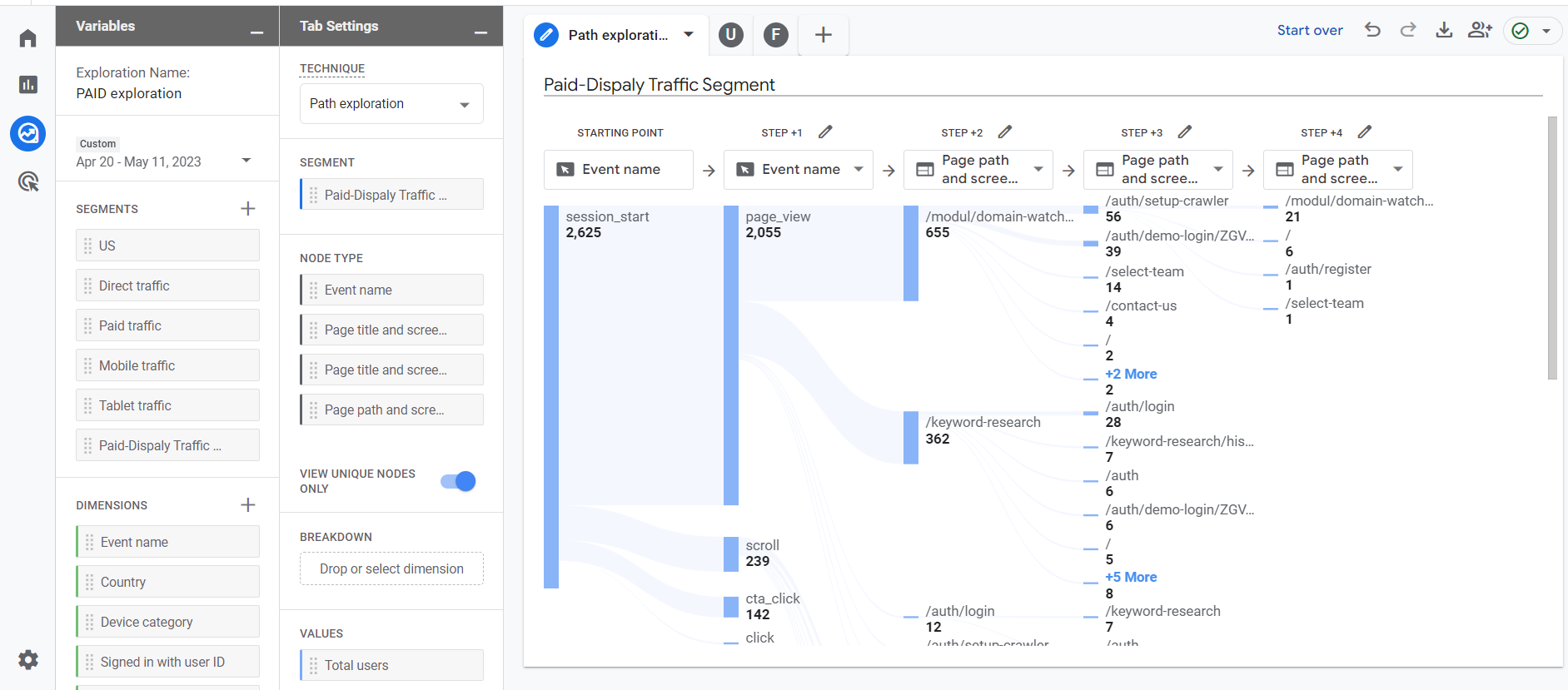Migration from Universal Analytics to Google Analytics 4

Universal Analytics must migrate to Google Analytics 4 by July 1, 2023. Ensure that your data in Universal Analytics is not lost before.
Published at Aug 07, 2023 08:08
Key Takeaways
-
Universal Analytics is migrating to Google Analytics with more insightful features.
-
The transition between Universal Analytics and Google Analytics 4 brings significant changes to the interface.
-
The migration steps and data export from Universal Analytics to Google Analytics 4.
Google consistently updates its tools to provide users with the most advanced analytics, and Universal Analytics (UA) is no exception. Businesses are likely familiar with Universal Analytics, which facilitates comprehensive business analysis by offering in-depth exploratory data.
Users are now aware that Universal Analytics will migrate to Google Analytics 4 (GA4), offering more attractive and insightful features. Google has already displayed this notification on Google Support and Universal Analytics accounts, indicating that all UA data will vanish by July 1, 2023.
The features in GA4 differ significantly from UA, making this migration more challenging than anticipated. Therefore, the following explanation aims to guide users through the UA to GA4 migration and ensure their existing data remains intact.
Migrating Universal Analytics to Google Analytics 4
Have you received the notification "This property will stop processing data starting on July 1, 2023. Complete setting up your new Google Analytics property as soon as possible"?
This means that Universal Analytics must switch to Google Analytics 4 before July 1, 2023. Unlike previous Google Analytics migrations, this transition is not as straightforward. Users need to ensure that all data is successfully transferred.

Why should Universal Analytics move to GA4? This shift is due to many users prioritizing account privacy, making it challenging for Universal Analytics to track users accurately. This limitation negatively impacts businesses as they cannot perform optimal user behavior analysis.
Compared to Universal Analytics, GA4 presents itself as a smarter analytical engine formulated in the form of the App + Web property integration, introduced in the beta version last year.
Google Analytics 4 also considers visitor privacy on your website, eliminating concerns about industry trends such as cookie restrictions that might cause data gaps.
Differences Between Universal Analytics and Google Analytics 4
What has changed in Google Analytics 4? Nearly all user-favorite reports and metrics have been restructured, significantly differing from Universal Analytics. Additionally, some metrics have been removed from Google Analytics 4.
The following metrics are no longer available in Google Analytics 4:
- Bounce Rate – can now be seen inversely through the Engagement Rate.
- Unique pageviews – removed from Google Analytics 4.
- Exit Rate and Entrance Rate – can be tracked using Path Exploration.
- Session Duration - Replaced with Average Engagement Rate.

Engagement Rate Replaces Bounce Rate
The Engagement Rate represents the average time of engagement, calculated across the site and landing pages. This is similar to the average session duration in Universal Analytics.
Part of the Engagement Rate includes mouse movements, scrolls, or other interactions. This feature replaces the previously available Bounce Rate in Universal Analytics, and users can calculate the Bounce Rate by looking at the inverse of the Engagement Rate.
For example, if the Engagement Rate on a page is 70%, then the Bounce Rate for that page is 30%.
Event Names and Event Calculations
Several events are crucial for business analysis. Google categorizes them as:
- Automatically collected events, which are gathered from GA4 itself, including click, first_visit, first_open, form start, form_submit, file_download, page_view, scroll, session_start, user_engagement, etc.
- Enhanced measurement events, collected when users set up GA4 and activate this feature, including page views, scrolls, outbound clicks, site search, video engagement, file downloads, and form interactions.
Exit Rate and Entrance Rate
Path exploration allows users to view the last page opened or frequently abandoned by users. Users can also see the last page closed by applying filters.

Migrating from Universal Analytics to Google Analytics 4
To create a new Google Analytics 4 account, follow these steps:
1. Create a new GA4 account by accessing the Admin menu and filling in the required data.

2. Create a new GA4 property, set location, time zone, and currency. This stage is generally similar to creating properties in Universal Analytics. If you already know how to do this, proceed as it always is.
3. Set up the flow to collect data. This is crucial to ensure proper data recording. This section can be found under View tag instructions. If it is active and successfully connected, the Data Flowing checkbox will be marked.

4. Connect GA4 to the managed website. Users can insert the Measurement ID into the website and activate the Google Analytics plugin on their website. Then, access Google Analytics 4, and the plugin will automatically detect the Measurement ID and properties.
If you previously used Universal Analytics, ensure that your Universal Analytics data remains intact. Typically, users receive notifications that Google Analytics 4 has not been fully set up.
In response to this situation, the following steps must be taken to ensure that Universal Analytics data is properly recorded on Google Analytics 4:
1. Access the Admin menu and click on Setup Assistant. In the Setup Assistant section, Google Analytics 4 that is well connected to the previously created Universal Analytics property will be marked with the information “Connected to (user's property).”
2. To ensure a successful connection between Universal Analytics and Google Analytics 4, users need to check features such as Data Collection, Property Settings, Google Ads, and Advanced Setup (Optional).

3. Users must also ensure that Google Analytics is connected to the managed website through the Data Streams menu, then check the View tag instructions on the Google Tag menu. If the installation is successful, the Data flowing checkbox will be marked.
If users previously used GTM integrated with Universal Analytics, they must manually switch to a new GTM integrated with Google Analytics 4.
Ensure that you switch to Google Analytics 4 and retain your Universal Analytics data before July 1, 2023. Do not hesitate to make the switch, as Google Analytics 4 can enrich your business analysis and insights.
We at cmlabs are committed to helping all our clients migrate from Universal Analytics to Google Analytics 4 seamlessly. For further assistance, please contact our marketing team. Achieve business success with in-depth data exploration with cmlabs.
As a dedicated news provider, we are committed to accuracy and reliability. We go the extra mile by attaching credible sources to support the data and information we present.
- Support Google: “[GA4] Introducing the next generation of Analytics, Google Analytics 4”, https://support.google.com/analytics/answer/10089681?hl=en
- “[UA→GA4] Comparing metrics: Google Analytics 4 vs. Universal Analytics”, https://support.google.com/analytics/answer/11986666?hl=en#zippy=%2Cin-this-article
- Support Google: “Universal Analytics is going away” https://support.google.com/analytics/answer/11583528?hl=en
cmlabs
Another post from cmlabs
SEO for React: 8 Ways to Optimize React App for Search Engines
Thu 11 Jul 2024, 16:00pm GMT + 73 Simple Ways to Repurpose Content
Tue 02 Jul 2024, 15:11pm GMT + 7What Is Entity-Based SEO? A Brief Guide
Tue 02 Jul 2024, 14:42pm GMT + 7Cloudflare CDN: Definition and Guidelines for Optimization
Mon 01 Jul 2024, 16:13pm GMT + 7More from cmlabs News your daily dose of SEO knowledge booster
In the development of its latest search engine, Bing has partnered with GPT-4 to deliver the most advanced search experience. Here are the details.
Bard, an experimental conversational AI service, combines information with language model intelligence. Check out the details here.
With the rapid advancement of AI technology, major search engines like Google and Bing are now equipped with their respective generative AI. Here is the detail.
WRITE YOUR COMMENT
You must login to comment




All Comments (0)
Sort By